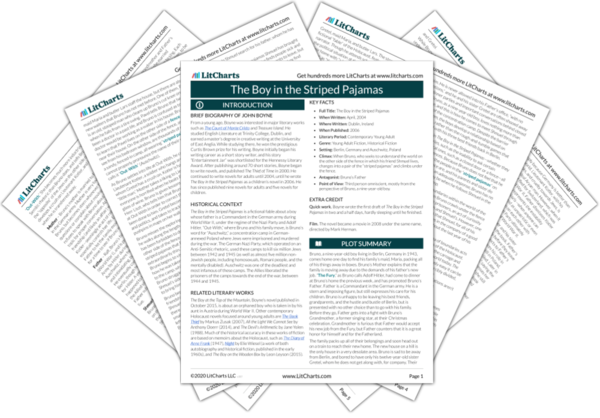Summary
Analysis
Bruno, who often does not get along with his twelve-year-old sister Gretel, secretly wishes she could have stayed behind in Berlin. Three years his elder, he has heard her described (likely by their parents) “on any number of occasions as being Trouble From Day One.” He is a little scared of her, and in Berlin she often liked to taunt him with her friends, such as insisting that he was only six years old instead of nine. Gretel has a lot of dolls, and spends a lot of time attending to them. Bruno is happy to be away from Berlin only due to the fact that her friends are no longer around to bother him.
Gretel is three years older than Bruno, and she never lets him forget it. She, like Bruno, is apparently left largely to her own devices to entertain herself in the family’s home, and she loves to play with her dolls. Though Gretel seems slightly less naïve than Bruno when it comes to the war and the realities of Hitler’s Third Reich, both children are extremely sheltered, and have few cares other than their familial bickering.
Themes
Bruno runs into Gretel’s room to find her arranging her dolls in her new bedroom. The siblings theorize about how long they might live in the new house. Father had told both of them that they would be living there for “the foreseeable future,” which Gretel believes to mean up to three weeks. They agree that the new location of their home is “horrible.” Gretel tells Bruno that Father told her the people who had lived at “Out-With” (which she speculates is the name of the house) before them had not done their jobs very well, and had to leave before making the house nice for the next family. The children wonder what “Out-With” means, and Gretel guesses that it means “out with the people who lived here before us.”
Here we finally get a familiar name that helps us figure out what’s going on—“Out-With” is a childish mispronunciation of “Auschwitz,” a Nazi concentration camp in Poland that was famous for being especially horrifying and deadly. The mispronunciation itself is symbolic, as it portrays the novel’s general idea of horror as seen through the lens of childhood innocence, and also because it could mean “out with” the Jews and other minorities who are killed there. Of course, this is a punny English mispronunciation of a German word, so Boyne is taking some creative liberties here with his German-speaking characters.
Themes
Bruno tells Gretel that he doesn’t like it in the new house, and she agrees with him again. He says he misses his best friends Karl, Daniel, and Martin, and Gretel says she misses Hilda, Isobel, and Louise, her own best friends. Bruno remarks that he doesn’t think “the other children look at all friendly.” Gretel asks him what he means by the other children, as there are no other homes near their house. Bruno tries to pretend that he hasn’t said anything about seeing other children, but Gretel insists that he explain himself.
When Bruno mentions the children he has seen outside of his window, he immediately regrets it—he has some kind of gut instinct that tells him there is something sinister about what he has seen. This initial reaction then calls into question just how “innocent” Bruno remains in the action that follows. He is certainly still young and naïve, but it may be that he remains more willfully ignorant than he should be because it is easier and more comfortable for him.
Themes
Bruno finally gives in to Gretel’s demands that he explain what he meant by seeing other children, and he pulls his sister into his bedroom. He points to the same window that he had been looking out of before. Gretel is just as shocked as Bruno was at what she sees outside the window.
Neither child fully understands who the people in the camp are, but something tells them that they are not simply the neighbors. Again the question of complicity arises, as Bruno and Gretel seem afraid of learning the horrifying truth, and so try to stay naïve.
Themes
Get the entire Striped Pajamas LitChart as a printable PDF.













